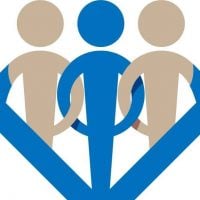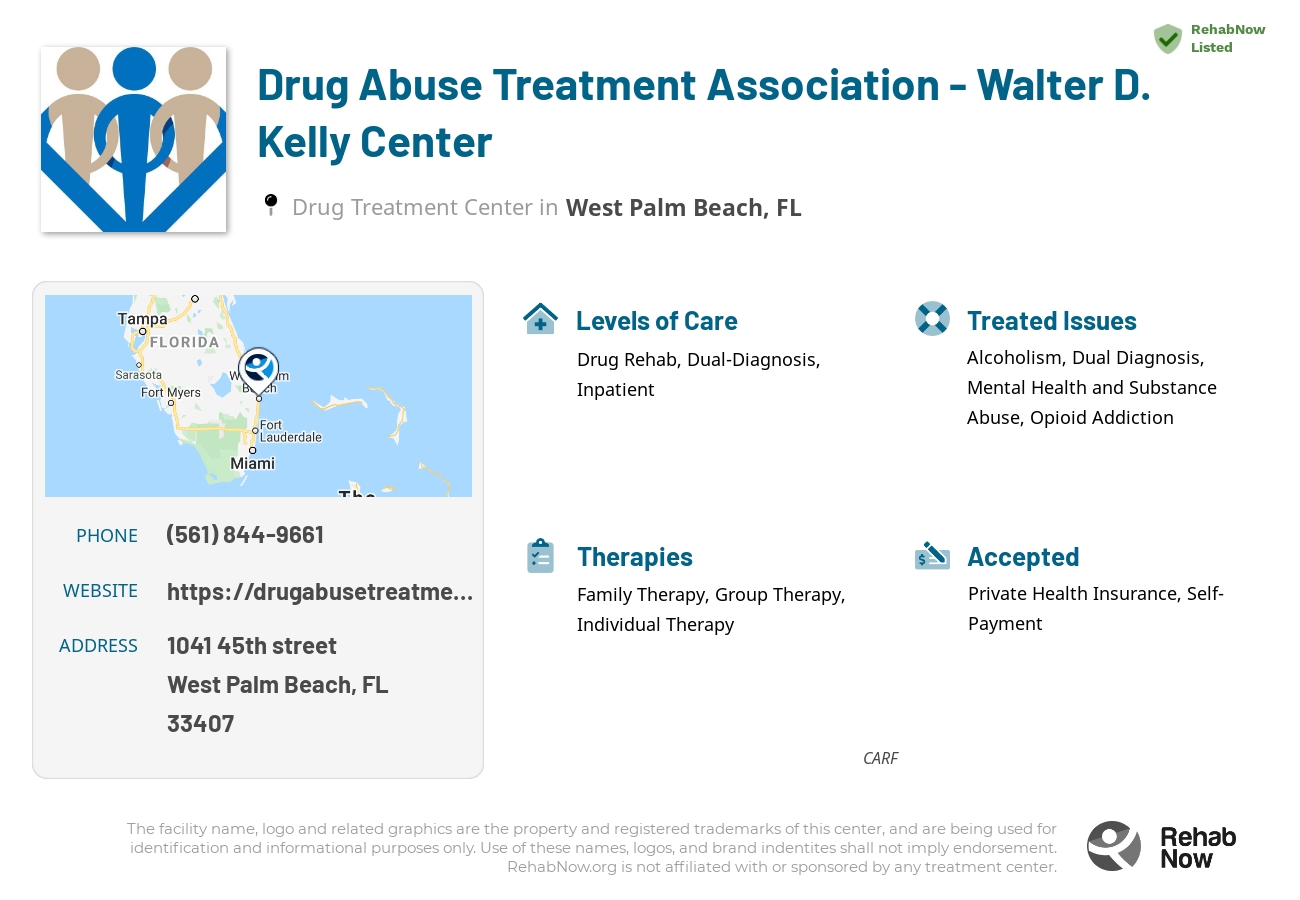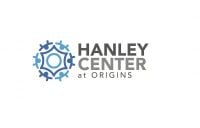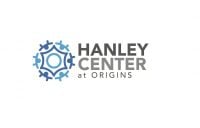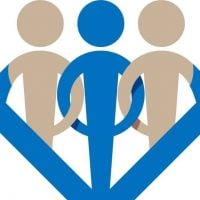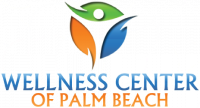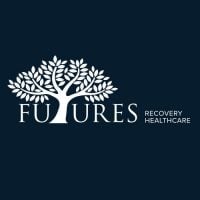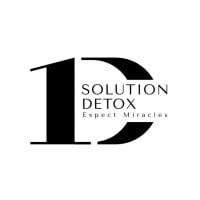Drug Abuse Treatment Association - Walter D. Kelly Center
Drug Rehab Center in West Palm Beach, Florida
The Drug Abuse Treatment Association - Walter D. Kelly Center is a CARF-accredited addiction treatment facility in West Palm Beach, Florida which provides personalized evidence-based treatment plans and aftercare support programs to help individuals struggling with alcoholism, dual diagnosis, opioid addiction, and other substance abuse issues.
About Drug Abuse Treatment Association - Walter D. Kelly Center in Florida
Located in the heart of West Palm Beach, Florida, the Drug Abuse Treatment Association – Walter D. Kelly Center stands out for its comprehensive rehab services for adults, children, and their families. With a focus on community engagement, this center not only offers inpatient and outpatient treatments but also mental health services and educational programs. Housing 20 beds, its unique approach to addressing both substance abuse and co-occurring mental health issues sets it apart.
Accredited by CARF, the Walter D. Kelly Center ensures quality care through evidence-based treatments and a variety of programs designed to foster recovery and healing. The center’s commitment to personalized treatment plans underscores its dedication to meeting the individual needs of its clients, emphasizing a path towards a healthier, addiction-free life.
- Provides a detailed mental health assessment and customized counseling as a cornerstone of its approach to treatment.
- Specializes in a residential program for adolescents, incorporating academic support and 24-hour care.
- Offers a Dual Diagnosis program, treating addiction alongside mental health conditions with a comprehensive strategy.
Serving a wide range of needs, the center tackles alcoholism, opioid addiction, drug addiction, and mental health disorders with a blend of therapeutic methods including motivational interviewing, cognitive behavioral therapy, and intensive outpatient programs. Tailored care levels ensure that each individual finds the right support for their journey to recovery.
Genders
Ages
Modality
Additional
Accreditations

CARF
The Commission on Accreditation of Rehabilitation Facilities (CARF) is a non-profit organization that specifically accredits rehab organizations. Founded in 1966, CARF's, mission is to help service providers like rehab facilities maintain high standards of care.
Conditions and Issues Treated
A combination of treatments is often needed to treat drug abuse. Some addictions can be treated with counseling and support groups. In other cases, drug abuse can lead to a medical problem and require medical treatment. Treatment for drug addiction typically combines counseling and psychotherapy with medication and behavioral therapies.
A combination of treatments is often needed to treat drug abuse issues effectively. In the case of drug abuse, there is no easy answer or one-size-fits-all cure.
Opioid addiction has become a significant health problem in the United States. In 2015, there were 91 opioid overdose-related deaths per day, with a substantial increase in mortality rate in 2014.
When opioid addiction has reached a point where a person’s life becomes unmanageable, treatment options are available to help them get sober. Treatment that includes medical care with medications and counseling can help a user transition into sobriety.
When someone in struggles with both addiction and mental or emotional illness, this is considered a dual diagnosis. Dual diagnosis treatment can include therapy for these issues to happen simultaneously, which will allow either of them to be treated effectively.
Sometimes people who have suffered from addiction disorder also suffer from co-occurring disorders such as depression, anxiety, bipolar disorder, etc., making them “dual diagnoses.” Dual diagnoses require specialized treatment programs where drug and alcohol addiction are addressed along with psychiatric illnesses. Some rehabilitation facilities provide patients suffering from cooccurrences a program with highly integrated services and a clean environment with few distractions to help them succeed.
Levels of Care Offered
This center offers a variety of custom treatment tailored to individual recovery. Currently available are Aftercare Support, Drug Rehab, Dual-Diagnosis, Inpatient, with additional therapies available as listed below.
Inpatient treatment for alcoholism or drug addiction is an option that provides the addict with a supportive environment in which they can stop using. After detox, an inpatient treatment center provides a structured environment for the addict to recover from their addiction and begin taking steps toward a lifetime of sobriety.
This type of treatment is appropriate for addicts that are most in need of intensive care and supervision. This includes those who were unable to quit on their own, those who need more structure than they can get in outpatient treatment, and those whose addiction has led them into legal trouble or severe health problems.
Completing a drug or alcohol rehab program is only the first step. Then comes aftercare support. These services include sober living accommodations, career counseling, and AA/NA programs for those struggling with sobriety or who want help maintaining it after initial rehab at an addiction facility.
They can last up to a year or more depending on what’s needed most urgently after the earlier stages are completed.
Therapies & Programs
Because no single treatment is effective for all addicts, the goal of treatment and therapy should be to figure out what works best for each individual. Tolerance and withdrawal levels differ from person to person, affecting the treatment intensity required. Addiction treatment should aim to help addicts develop healthy coping mechanisms for dealing with their addiction and its underlying causes.
Couples therapy works with clients and significant others in a professional capacity to improve relationship dynamics. This can be helpful for addicts who are trying to marry the idea of recovery into their work, family, social lives – any aspect that has to do with relationships. Through counseling sessions, addicts will have an opportunity to talk about their addiction with professional partners.
Family therapy is beneficial for people who are in addiction treatment services because it offers addicts the opportunity to work with their family members to better understand what led them to make choices that contributed to their addiction.
This type of therapy helps family members reach a deeper understanding of how they can best support their loved one during recovery. It also helps the addict better understand their own motivations and triggers that led them to turn to substance abuse.
Family therapy can help addicts in the following ways:
- Assists family members in processing difficult feelings so they don’t blame or resent recovering addicts
- Assists family members in understanding how addiction has impacted the addict and everyone who is involved with them
- Allows the addict to take responsibility for their actions, while encouraging improved communication skills
- Helps family members understand how to best support an individual in recovery so addicts don’t relapse again.
Group therapy can help build a stronger support system and give addicts in West Palm Beach, FL insight into their addiction that they gain through shared conversations. Group therapy occurs in a controlled group environment, exclusive of one on one meetings. This makes it safer for patients to feel comfortable sharing the struggles they’re going through and gaining perspective.
Trauma therapy is beneficial for people who are recovering from drug addiction because it helps them heal from past traumas that may have caused them to turn to harmful substances or led them to experience negative emotions that contributed to their destructive behaviors.
This type of treatment works by processing difficult experiences so individuals can learn how to process these events without having to turn to substances for coping.
Trauma therapy can help addicts in the following ways:
- Helps individuals understand their experiences and emotional responses to difficult events, including why they turned to drugs or alcohol
- Provides them with comfort and support while working through difficult emotions related to these traumatic experiences
- Offers an opportunity for addicts to have a voice and be heard, which can improve their self-esteem
- Can help them develop coping skills so they can better respond to triggers instead of turning to substance abuse.
Cognitive-behavioral therapy is a technique that is used to help people with addiction. Specifically, it is a way of identifying thoughts and behaviors that cause the addiction. It is typically used in an individual counseling session.
The content explains cognitive behavioral therapy and how it works to address some behaviors that may be leading to unintended consequences in their life, as well as its benefits for those seeking sobriety.
It works by helping people to talk through their issues and addressing the thoughts that cause said behaviors. It is an excellent way of learning about oneself and one’s perception of the world.
The 12-step program is a common method used to treat addiction. It is successful for many people and includes acknowledging the problem, making changes, and honesty. The program is available in most cities in the United States and helps those addicted to drugs or alcohol achieve sobriety. In this program, peers help each other achieve the goal of abstinence.
The 12 steps dictate that individuals accept that they are addicts and understand the consequences of their addiction. They then work towards recovery and make amends to others they have hurt. The process of cognitive restructuring helps individuals change their negative thoughts into positive ones. The 12-step program provides the benefit of building a support network, which is essential for recovery.
Behavioral therapies, such as contingency management, are widely used to improve drug addiction outcomes. Contingency management is a type of CM that uses rewards to increase desired behaviors, such as abstinence. LPE is a highly effective and low-cost treatment that has been used with populations across the intellectual and developmental spectrum for decades. It is based on the principle that reinforcing desired behavior will increase the likelihood of that behavior occurring again in the future.
LPE has become an integral component of outpatient substance abuse treatment and relapse prevention for both adults and adolescents. It is similar to contingency management programs used in substance abuse treatment, and clinical studies have shown that it can effectively treat drug addiction, reduce the number of days using drugs, and prevent relapse.
Payment Options Accepted
For specific insurance or payment methods please contact us.
Is your insurance accepted?
Ask an expert, call (888) 674-0062
Drug Abuse Treatment Association Associated Centers
Discover treatment facilities under the same provider.
- Drug Abuse Treatment Association - Fort Pierce in Fort Pierce, FL
- Drug Abuse Treatment Association - West Palm Beach in West Palm Beach, FL
Learn More About Drug Abuse Treatment Association Centers
Additional Details
Specifics, location, and helpful extra information.
West Palm Beach, Florida 33407 Phone Number(561) 844-9661 Meta DetailsUpdated April 15, 2024
Staff Verified
Drug Abuse Treatment Association - Walter D. Kelly Center Patient Reviews
There are no reviews yet. Be the first one to write one.
West Palm Beach, Florida Addiction Information
Florida is one of the nation's epicenters for substance abuse and drug-related overdoses. In 2014, around 410,000 Florida residents were addicted to drugs and alcohol. Over the last 10 years, 12% of all deaths in the state were attributed to substance abuse. Treatment admissions for alcohol reached 24,329 patients in 2016, and 2.5% of Florida high school students admitted to using crack cocaine.
More than half of all drug-related deaths in West Palm Beach, FL, are related to cocaine. Heroin and prescription opioid abuse is also a significant problem. The number of overdose deaths in Palm Beach County increased by 23% from 2015 to 2016. Overdose deaths cost the community $68 million in 2018. To combat this problem, the city offers a variety of treatment options. One of the most popular options is outpatient treatment.
Treatment in Nearby Cities
- Venice, FL (149.2 mi.)
- Lake Mary, FL (158.3 mi.)
- Lutz, FL (175.8 mi.)
- Satellite Beach, FL (103.4 mi.)
- Port Orange, FL (174.3 mi.)
Centers near Drug Abuse Treatment Association - Walter D. Kelly Center
The facility name, logo and brand are the property and registered trademarks of Drug Abuse Treatment Association - Walter D. Kelly Center, and are being used for identification and informational purposes only. Use of these names, logos and brands shall not imply endorsement. RehabNow.org is not affiliated with or sponsored by Drug Abuse Treatment Association - Walter D. Kelly Center.
